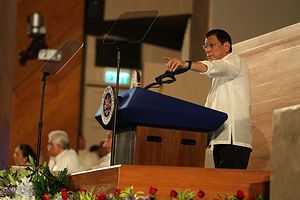Last month, Philippine President Rodrigo Duterte talked about environmental protection during his third state of the nation address. But, unsurprisingly, he failed to mention the policies of his government that have contributed to the degradation of the country’s natural resources in the past two years.
Duterte said he had ordered the closure of Boracay Island to stop the worsening pollution in the popular tourism destination, which was a fair point to bring up. But he was silent about the reported construction of Chinese casinos on the island, perhaps owing to his recent softening of the country’s stance toward Beijing. Neither did he repeat his earlier appeal to residents to sell their lands to big private developers, which did not go unnoticed.
Duterte also touched on the mining industry. He appropriately stressed that mining should not destroy the future of the country, and that “irresponsible” mining firms need to repair what they have mismanaged. Duterte’s message was echoed by Department of Environment and Natural Resources (DENR) Secretary Roy Cimatu, who vowed to “reinvent” the mining industry. Cimatu added that the top budget priority of DENR is the Enhanced National Greening Program, which features forest protection and biodiversity conservation.
The Duterte government should be credited for its consistent stance opposing open pit mining. But what Duterte and Cimatu didn’t highlight was the lifting of the moratorium on mining exploration. Close observers of the issue will know that before Cimatu became DENR secretary in 2017, his predecessor, Gina Lopez, a “crusading” environmentalist, ordered the closure of 27 mining sites for violating the country’s environmental laws. But since Cimatu has been appointed, through a review process endorsed by the new secretary, 23 of the 27 suspended mining sites were later found to be compliant with the directives of the DENR, essentially reversing the previous decision.
Another point Duterte has not been emphasizing as much has been the dangers posed by the drilling and construction activities of the Chinese military in the South China Sea (known in the Philippines as West Philippine Sea). Wider geopolitical implications aside, the building of military outposts in the contested waters has also disrupted and destroyed marine resources near the coastal areas of the Philippines. But Duterte has largely kept his silence so far, while the government has refused to actively oppose China’s reclamation activities.
It should be noted that Duterte’s ambitious infrastructure program also involves massive reclamation across the country. The biggest reclamation site is located in Manila Bay; critics have denounced it as an irreversible project that threatens to displace thousands of fisherfolk while destroying mangroves, seagrass, and even protected marine habitats.
In addition, mining, logging, and reclamation activities are expected to intensify if the proposal to change the 1987 constitution is passed by Congress. There are various drafts submitted to Congress, but all of them include several provisions allowing foreign ownership of lands and the exploitation of the country’s resources. Critics have warned that the Duterte-backed charter change campaign could lead to the wanton plunder of the country’s resources by big foreign corporations and their local proxies.
Finally, the Duterte government’s notorious record as a human rights violator also includes the intimidation and killing of environmental advocates. According to Global Witness, a London-based nonprofit group, the Philippines is the second deadliest country in the world, and the most dangerous in Asia, for land and environmental defenders. Global Witness recorded 48 cases of killings in 2017, second only to Brazil’s 57 deaths. The rise in killings is linked to the aggressive expansion of the extractive industries backed by a government accused of committing widespread human rights abuses.
Duterte is expected to continue boasting of his decisive action in Boracay and his opposition to open-pit mining as proofs of his supposedly pro-environment agenda. But these claims ring hollow in the face of clear neglect of the country’s resources in favor of Duterte’s friends and cronies, who are also the country’s big-time miners, plantation owners, and real estate developers.

































